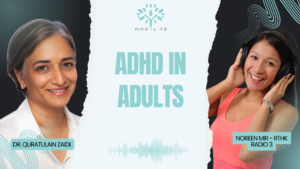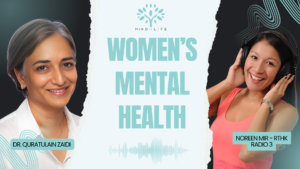When the safety and well-being of ourselves or our loved ones are threatened, we go into survival mode. This may involve overwhelming feelings, dulled thoughts, adrenaline rushes, and rapid fight-flight reactions. Even when we have made it to safety, the sheer intensity of the traumatic situation may leave us struggling with the aftermath, triggering persistent trauma responses that can quickly drain our mental and physical health.
Below are 5 tips on how to protect your mental health while recovering from trauma.
1. Make room for your feelings:
Feelings after a traumatic experience can be confusing, intense, or even numb and empty. It’s important to realise that feelings do not need to make sense and often, they do not. Instead of trying to understand or regulate your feelings, let them arise naturally, accepting that they are there and welcoming them. The key here is observation: allowing yourself the chance to engage with your feelings and the physical sensations that accompany them in a safe environment. This facilitates healthy emotional recovery by integrating our emotions into our memory of the event and giving the brain space to process them.
Writing our feelings down and keeping a record of them can also support recovery. Following a traumatic event, reflecting on our feelings can allow us to explore them with attentiveness. It also gives us the opportunity to identify patterns in how we are dealing with the trauma over time. This in turn gives us a sense of how we are moving forward, and where we we may need additional support.
2. Acknowledge guilt or shame
Guilt and shame are common feelings experienced after trauma. However, they are so uncomfortable that we often do not speak about them or even acknowledge them. Such avoidance can drive us to push the traumatic incident out of memory, hindering our healthy trauma processing. We may feel guilty or ashamed for how we acted during or subsequent the traumatic situation, or even that we survived when others did not. These feelings are normal and valid, and they give us information about ourselves and the world around us. However, it is important to remember that they do not reflect an objective reality. We are not our feelings and just because we feel bad about something does not mean that we are bad.
3. Give yourself permission to not be on top of everything
Trauma is often followed by brain fog, which can lead to difficulties concentrating, remembering and making decisions. In fact, we are likely to have memory gaps of the traumatic event itself, which can feel disorienting and distressing. The brain has gone full steam to facilitate our survival during an overwhelming experience: it deserves recovery time and should not be expected to perform at its usual or optimum level. It is crucial to give the brain time to rest. This will promote recovery and allow us to return to our best efficiency much faster than if we try to push against the brain fog. To rest, try focusing on sleep, mindfulness, meditation, exercise, connecting with nature, and reflection. During this time, it is important to prioritise grounding and soothing ourselves to help our brains feel calm and safe.
4. Connect with loved ones in meaningful ways
Trauma can make us feel disconnected and isolated. Research shows that part of trauma recovery is reconnecting and activating areas of our brain that are associated with positive social interactions. It is crucial to reach out to loved ones, even if we feel like avoiding them. Spending time with people who we feel safe with can not only help to re-establish our sense of safety, but also acts as a natural mood booster, strengthening our feeling of belonging. This is enhanced if our loved ones are emotionally attuned to us, or willing and able to listen. Our loved ones can help validate our feelings and support our needs in the period following trauma. Engaging in fun activities, sharing our feelings and thoughts, working on projects together or just relaxing can contribute to making us feel connected, loved, and safe. A meaningful activity could be to speak about our traumatic experience, though that does not need to happen immediately.
5. Examine your thoughts
Trauma can shake our assumptive worldview. Generally, we take for granted that, at least to some extent, the world is a predictable, safe, and fair place. We assume that people have good intentions. However, traumatic experiences disrupt these assumptions, and we may find ourselves weighed down by fear and negativity about the state of the world and our own lives. This can have long-lasting, negative effects on how we interact with other people and the world around us. This is why it is important to examine our thoughts following a traumatic incident. How have our beliefs changed? Do we think differently about ourselves or others? What did the experience mean to us? Part of trauma recovery includes making meaning from the traumatic experience. Examining our thoughts is the first step toward this.
If you or someone you know would benefit from professional help, please reach out to Dr Esslin Terrighena. Dr Esslin Terrighena is one of the few therapists in Hong Kong qualified for in depth complex trauma treatment. She helps those who have faced abuse, neglect, grief, anxiety and depression.







